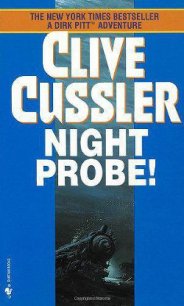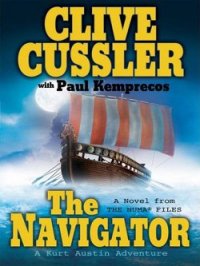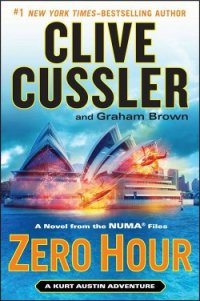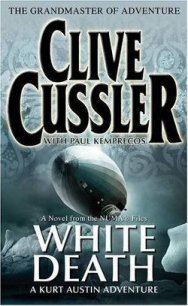Inca Gold - Cussler Clive (читать онлайн полную книгу .TXT) 📗
"A necessity. We've already found and processed over ninety percent of all the land organisms that provide sources of medicine to treat diseases. Aspirin and quinine come from the bark of trees. Chemicals contained in everything from snake venom to secretion from frogs to lymph from pigs' glands are used in drug compounds. But marine creatures and the microorganisms that dwell in the depths have been an untapped source, and might well be the hope of curing every affliction, including the common cold, cancer, or AIDS."
"But surely you can't simply go out and bring back a boatload of microbes for processing at a laboratory for distribution to your friendly pharmacy?"
"Not as farfetched as you might think," he said. "Any one of a hundred organisms that live in a drop of water can be cultivated, harvested, and rendered into medicines. Jellyfish, an invertebrate animal called a bryozoan, certain sponges, and several corals are currently being developed into anticancer medicines, anti-inflammatory agents for arthritis pain, and drugs that suppress organ rejection after transplant surgery. The test results on a chemical isolated from kelp look especially encouraging in combating a drug-resistant strain of tuberculosis."
"Just where in the ocean are you looking for these wonder drugs?" asked Shannon.
"This expedition is concentrating on a ridge of chimneylike vents where hot magma from within the earth's mantle comes in contact with cold seawater and spews through a series of cracks before spreading across the bottom. You might call it a deep-ocean hot spring. Various minerals are deposited over a wide area-copper, zinc, iron, along with water heavy in hydrogen sulfide. Incredibly, vast colonies of giant clams, mussels, huge tube worms, and bacteria that utilize the sulfur compounds to synthesize sugars live and thrive in this dark and toxic environment. It is this remarkable species of sea life that we're collecting with submersibles for laboratory testing and clinical trials back in the States."
"Are there many scientists working on these miracle cures?"
Pitt shook his head. "Around the world, maybe fifty or sixty. Marine medical research is still in its infancy."
"How long before we see the drugs on the market?"
"The regulatory obstacles are staggering. Doctors won't be prescribing many of these medications for another ten years."
Shannon walked over to an array of monitors that filled an entire panel of one bulkhead. "This looks impressive."
"Our secondary mission is to map the seafloor wherever the ship sails."
"What are the monitors showing?"
"You're looking at the bottom of the sea in a myriad of shapes and images," Pitt explained. "Our long-range, low-resolution side-scan sonar system can record a swath in three-dimensional color up to fifty kilometers wide."
Shannon stared at the incredible display of ravines and mountains thousands of meters below the ship. "I never thought I'd be able to observe the land beneath the sea this clearly. It's like staring out the window of an airliner over the Rocky Mountains."
"With computer enhancement it becomes even sharper."
"Romance of the seven seas," she waxed philosophically. "You're like the early explorers who charted new worlds."
Pitt laughed. "High tech takes away any hint of the romance."
They left the bridge, and he showed her through the ship's laboratory where a team of chemists and marine biologists were fussing over a dozen glass tanks teeming with a hundred different denizens from the deep, studying data from computer monitors, and examining microorganisms under microscopes.
"After retrieval from the bottom," said Pitt, "this is where the first step in the quest for new drugs begins."
"What is your part in all of this?" Shannon asked.
"Al Giordino and I operate the robotic vehicles that probe the seafloor for promising organism sites. When we think we've located a prime location, we go down in a submersible to collect the specimens."
She sighed. "Your field is far more exotic than mine."
Pitt shook his head. "I disagree. Searching into the origins of our ancestors can be pretty exotic in its own right. If we feel no attraction for the past, why do millions of us pay homage to ancient Egypt, Rome, and Athens every year? Why do we wander over the battlefields of Gettysburg and Waterloo or stand on the cliffs and look down on the beaches of Normandy? Because we have to look back into history to see ourselves."
Shannon stood silently. She had expected a certain coldness from a man whom she had watched kill without apparent remorse. She was surprised at the depth of his words, at his easy way of expressing ideas.
He spoke of the sea, of shipwrecks, and of lost treasure. She described the great archaeological mysteries waiting to be solved. There was mutual delight in this exchange, yet there was still an indefinable gap between them. Neither felt strongly attracted to the other.
They had strolled out on deck and were leaning over the railing, watching the white foam thrown from the Deep Fathom's bow slide past the hull and merge with the froth from the wake, when skipper Frank Stewart appeared.
"It's official," he said in his soft Alabama drawl, "we've been ordered to transport the Peruvian young people and Dr. Kelsey to Lima's port city of Callao."
"You were in communication with Admiral Sandecker?" inquired Pitt.
Stewart shook his head. "His director of operations, Rudi Gunn."
"After we set everyone on shore, I assume we sail back on-site and continue with the project?"
"The crew and I do. You and Al have been ordered to return to the sacred well and retrieve Dr. Miller's body."
Pitt looked at Stewart as if he were a psychiatrist contemplating a mental case. "Why us? Why not the Peruvian police?"
Stewart shrugged. "When I protested that the two of you were vital to the specimen collection operation, Gunn said he was flying in your replacements from NUMA's research lab in Key West. That's all he would say."
Pitt swung a hand toward the empty helicopter landing pad. "Did you inform Rudi that Al and I are not exactly popular with the local natives and that we're fresh out of aircraft?"
"No to the former." Stewart grinned. "Yes to the latter. American embassy officials are making arrangements for you to charter a commercial helicopter in Lima."
"This makes about as much sense as ordering a peanut butter sandwich in a French restaurant."
"If you have a complaint, I suggest you take it up with Gunn personally when he meets us on the dock in Callao."
Pitt's eyes narrowed. "Sandecker's right-hand man flies over sixty-five hundred kilometers from Washington to oversee a body recovery? What gives?"
"More than meets the eye, obviously," said Stewart. He turned and looked at Shannon. "Gunn also relayed a message to you from a David Gaskill. He said you'd recall the name."
She seemed to stare at the deck in thought for a moment. "Yes, I remember, he's an undercover agent with the U.S. Customs Service who specializes in the illicit smuggling of antiquities."
Stewart continued, "Gaskill said to tell you he thinks he's traced the Golden Body Suit of Tiapollo to a private collector in Chicago."




